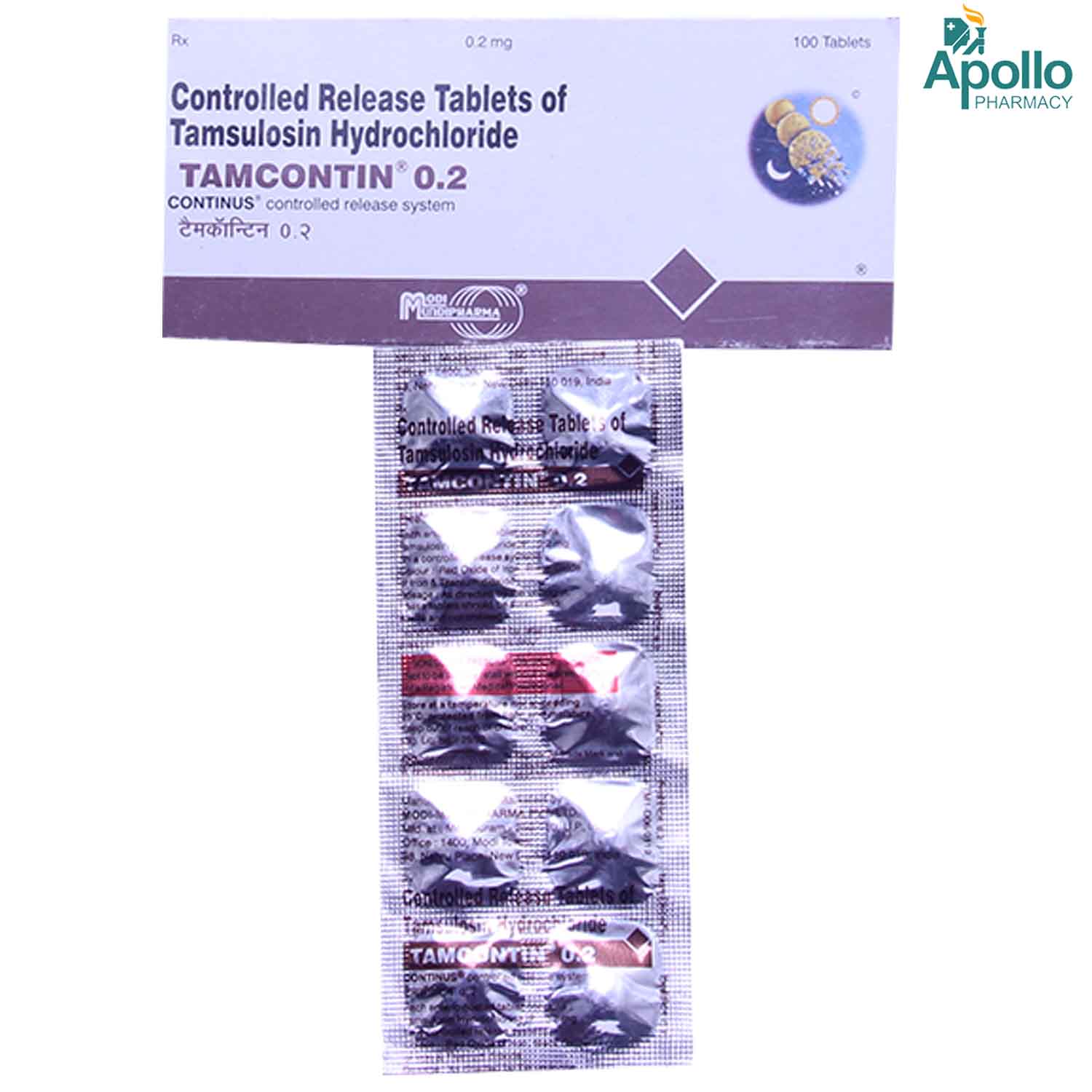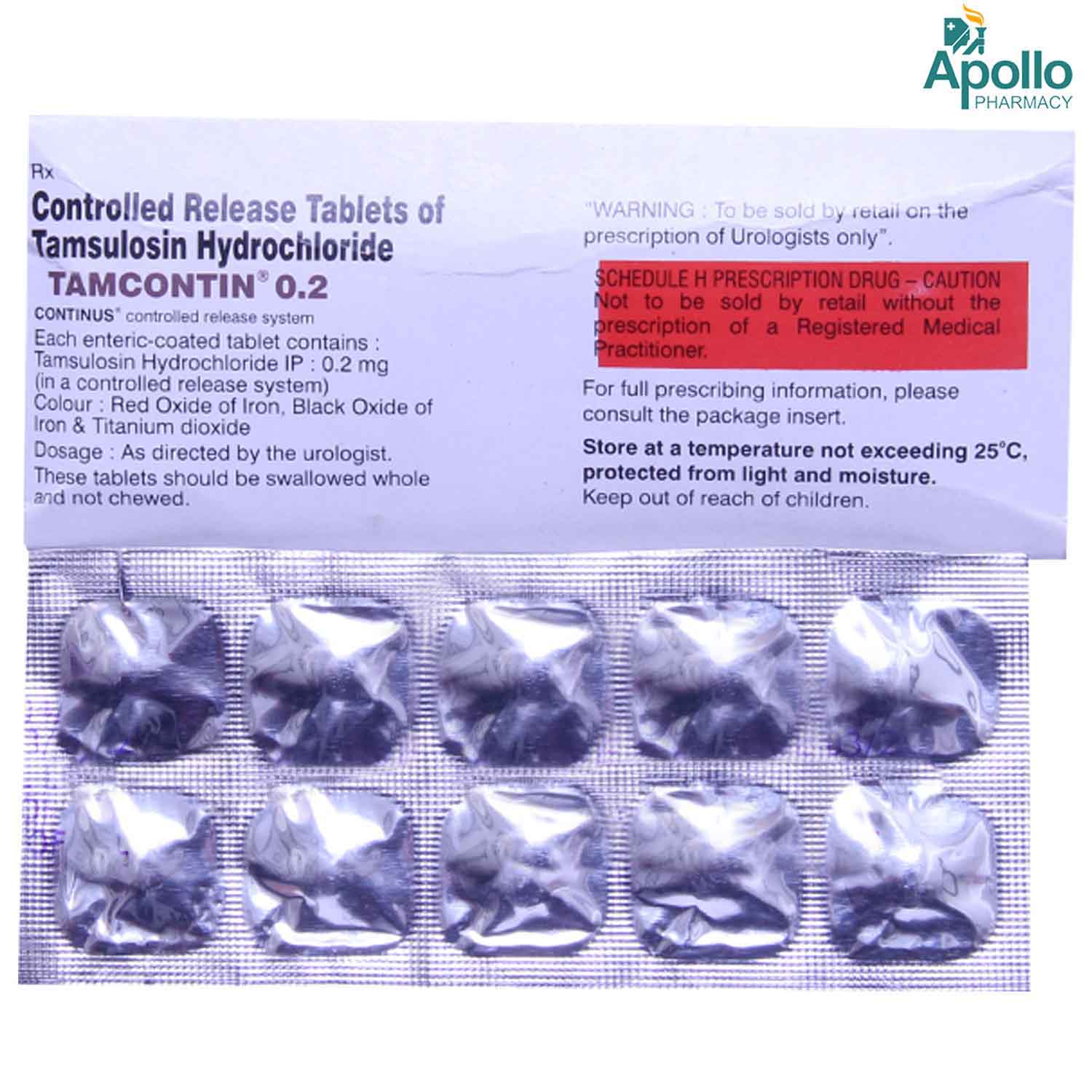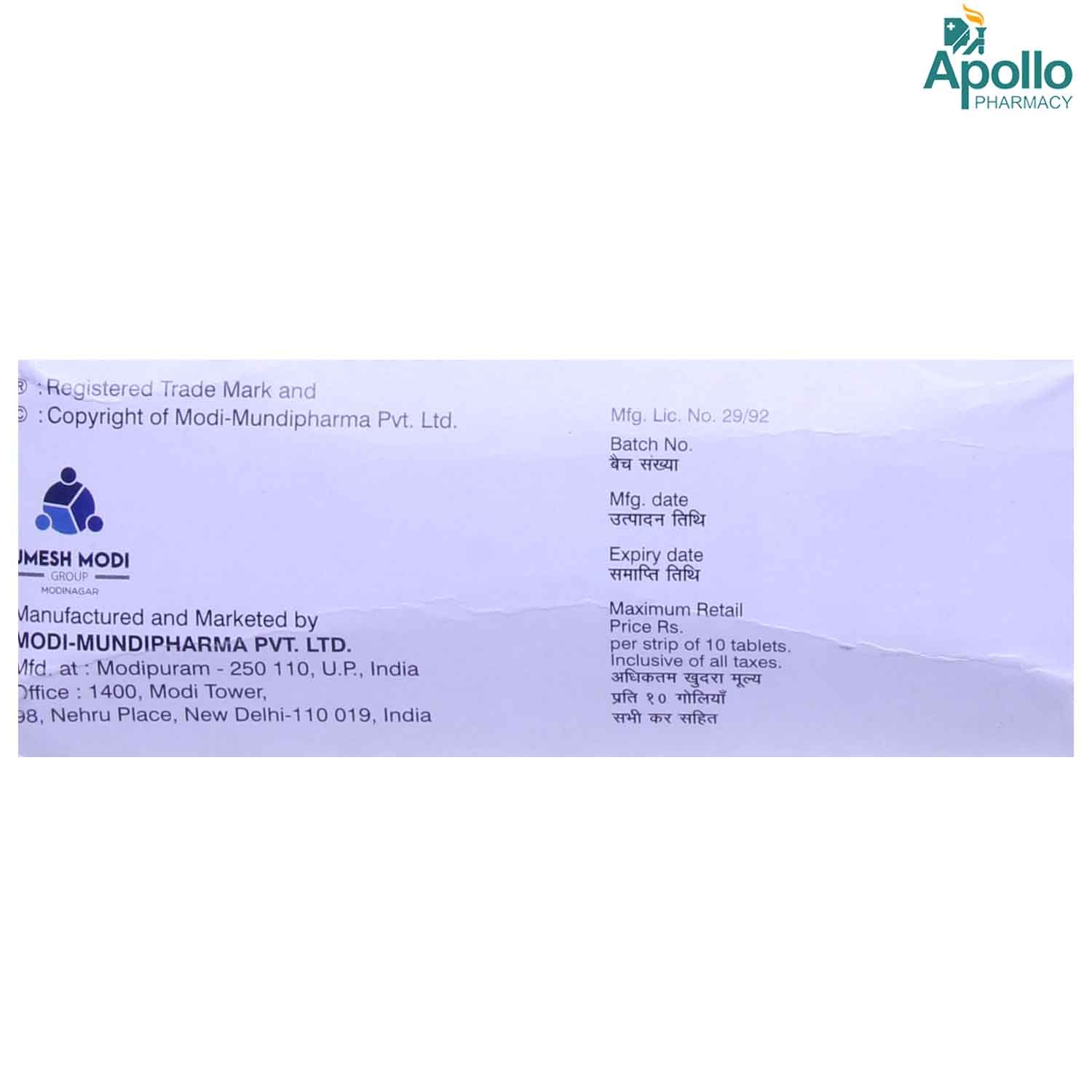TAMCONTIN 0.2MG TABLET
MRP ₹140
(Inclusive of all Taxes)
₹21.0 Cashback (15%)
Provide Delivery Location
Online payment accepted
 Prescription drug
Prescription drugWhats That
Composition :
Manufacturer/Marketer :
Consume Type :
Expires on or after :
Return Policy :
About TAMCONTIN 0.2MG TABLET
TAMCONTIN 0.2MG TABLET belongs to the category of medicine called 'alpha-blocker' primarily used to treat benign prostatic hyperplasia - BPH (enlarged prostate), and urinary bladder outlet obstruction. It relaxes the prostate gland’s muscles and urinary bladder neck at the obstruction site, resulting in improved urine flow with reduced BPH symptoms. TAMCONTIN 0.2MG TABLET is for use by men only and not indicated for use by women. TAMCONTIN 0.2MG TABLET does not cure prostate cancer. Benign prostatic hyperplasia (enlarged prostate gland) is a non-cancerous growth of the prostate gland caused due to overproduction of a hormone called ‘dihydrotestosterone’ in men. As the gland enlarges, it can lead to urinary problems, such as difficulty passing urine and frequent urination. TAMCONTIN 0.2MG TABLET helps in getting relief from these symptoms.
TAMCONTIN 0.2MG TABLET contains Tamsulosin hydrochloride (alpha-blocker) which primarily treats the enlarged prostate gland leading to urinary problems (like difficulty in passing urine and a frequent urination urge). It is a prodrug, and it gets broken down into its active form (i.e. Tamsulosin) in the gut (intestine). TAMCONTIN 0.2MG TABLET makes it easy to pass urine by relaxing the muscles of the prostate gland. Effectively, it improves the symptoms of Benign Hyperplasia Prostate (BPH).
Take TAMCONTIN 0.2MG TABLET as prescribed. The most common side effects of TAMCONTIN 0.2MG TABLET are low blood pressure (hypotension), dizziness, drowsiness, reduced sex drive (libido), inability to get an erection (impotence) and tenderness or enlargement of your breasts (in men), sleeplessness, runny nose or ejaculatory problems. These side effects may disappear when you continue to take TAMCONTIN 0.2MG TABLET. Although, if these side effects persist, contact the doctor.
Women or children should not take TAMCONTIN 0.2MG TABLET. Please inform your doctor before starting TAMCONTIN 0.2MG TABLET if you have low blood pressure, liver/kidney disease, or a history of heart problems. You are also advised to wear a condom while having sexual intercourse, especially when your partner is pregnant, as TAMCONTIN 0.2MG TABLET is known to pass in semen. Do not donate blood while taking TAMCONTIN 0.2MG TABLET. You can donate blood 6 months after you have taken the last dose of TAMCONTIN 0.2MG TABLET. Patients taking TAMCONTIN 0.2MG TABLET should be cautioned about driving, operating machinery, or performing hazardous tasks as it can cause drowsiness or dizziness. In rare cases, problems of penis erection, ejaculation, and pain in the penis. So if these symptoms are for a longer time, immediately contact your doctor.
Uses of TAMCONTIN 0.2MG TABLET
Directions for Use
Key Benefits
TAMCONTIN 0.2MG TABLET contains tamsulosin (alpha-blocker), primarily used to treat the enlarged prostate gland in the male. It is a prodrug, and it gets broken down into its active form (i.e. Tamsulosin) in the gut. TAMCONTIN 0.2MG TABLET decreases urinary problems, like difficulty in passing urine and a frequent urination urge. TAMCONTIN 0.2MG TABLET makes it easy to pass urine by relaxing the muscles around the bladder exit and prostate gland. Effectively, it improves the symptoms of BPH like urine flow, hesitancy, and incomplete bladder emptying.
Storage
- Hydrate your body: Drink enough water to prevent dehydration and headaches.
- Calm Your Mind: Deep breathing and meditation can help you relax and relieve stress.
- Rest and Recharge: Sleep for 7-8 hours to reduce headache triggers.
- Take rest: lie down in a quiet, dark environment.
- Cold or warm compresses can help reduce tension.
- Stay Upright: Maintain good posture to keep symptoms from getting worse.
- To treat headaches naturally, try acupuncture or massage therapy.
- Over-the-counter pain relievers include acetaminophen and ibuprofen.
- Prescription Assistance: Speak with your doctor about more substantial drug alternatives.
- Severe Headaches: Seek emergency medical assistance for sudden, severe headaches.
- Frequent Headaches: If you get reoccurring headaches, consult your doctor.
- Headaches with Symptoms: Seek medical attention if your headaches include fever, disorientation, or weakness.
- Quit smoking as smoking impairs erectile function by significantly damaging blood vessels.
- Maintain a healthy weight as overweight can cause erectile dysfunction.
- Exercise regularly as physical activity enhances blood flow and overall health, benefiting erectile function.
- Consume a healthy diet loaded with whole grains, fruits and vegetables.
- Limit alcohol consumption as excessive alcohol intake can impair erectile function.
- Manage stress by practicing techniques such as yoga, relaxation exercises or meditation.
- In case erectile dysfunction is due to psychological factors, consider couple counselling or sex therapy to address relationship and anxiety issues.
- Openly discuss your concerns with your partner.
- If you experience a decrease in sex drive or libido, inform your doctor.
- Informing your doctor about your symptoms will help them assess your condition to determine the root cause.
- During the assessment, your doctor will evaluate whether your medications contribute to the poor sex drive.
- If your medications are found to be the cause, your doctor will review and adjust or change them to prevent further sexual dysfunction.
- Your doctor may recommend lifestyle changes like stress management, exercise, counselling, and medication adjustments.
- In addition to lifestyle changes, addressing underlying medical conditions, such as depression, anxiety, or sleep disorders, can help manage poor sex drive.
- To monitor your progress, your doctor will schedule regular check-ups and may order diagnostic tests to track your sexual health and adjust your treatment plan as needed.
- Regular follow-up appointments with your doctor will ensure that your sexual health remains stable and that any necessary adjustments are made to your treatment plan.
- Regular activity including cardio and weightlifting can help in weight loss and breast tissue reduction.
- Limit alcohol intake to lower your chances of gynecomastia and hormonal changes.
- Eat a balanced diet and avoid foods high in estrogen-like compounds.
- Follow your doctor's instructions take medication consistently to reduce breast enlargement and do not stop taking medication on your own.
- Inform your doctor about dizziness symptoms. They may adjust your medication regimen or prescribe additional medications to manage symptoms.
- Follow your doctor's instructions for taking medication, and take it at the same time every day to minimize dizziness.
- When standing up, do so slowly and carefully to avoid sudden dizziness.
- Avoid making sudden movements, such as turning or bending quickly, which can exacerbate dizziness.
- Drink plenty of water throughout the day to stay hydrated and help alleviate dizziness symptoms.
- If you're feeling dizzy, sit or lie down and rest until the dizziness passes.
- Track when dizziness occurs and any factors that may trigger it, and share this information with your doctor to help manage symptoms.
- A blocked nose can be relieved by drinking more water, which helps clear fluids.
- Use saline nasal spray available over the counter to relieve blockage or blow harder to remove the mucus.
- Use nasal strips that can be placed on the nose to widen nostrils and increase airflow.
- Keep a humidifier around to moisten air at home/workplace.
- Inform Your Doctor: Notify your doctor immediately about your diarrhoea symptoms. This allows them to adjust your medication or provide guidance on managing side effects.
- Stay Hydrated: Drink plenty of fluids to replace lost water and electrolytes. Choose water, clear broth, and electrolyte-rich drinks. Avoid carbonated or caffeinated beverages to effectively rehydrate your body.
- Follow a Bland Diet: Eat easy-to-digest foods to help firm up your stool and settle your stomach. Try incorporating bananas, rice, applesauce, toast, plain crackers, and boiled vegetables into your diet.
- Avoid Trigger Foods: Steer clear of foods that can worsen diarrhoea, such as spicy, fatty, or greasy foods, high-fibre foods, and dairy products (especially if you're lactose intolerant).
- Practice Good Hygiene: Maintain good hygiene to prevent the spread of infection. To stay healthy, wash your hands frequently, clean and disinfect surfaces regularly, and avoid exchanging personal belongings with others.
- Take Anti-Diarrheal Medications: If your doctor advises, anti-diarrheal medications such as loperamide might help manage diarrhoea symptoms. Always follow your doctor's directions.
- Keep track of your diarrhoea symptoms. If they don't get better or worse or are accompanied by severe stomach pain, blood, or dehydration signs (like extreme thirst or dark urine), seek medical help.
Drug Warnings
TAMCONTIN 0.2MG TABLET should be taken with caution in people with liver or kidney disease, low blood pressure, prostate cancer history, or allergic to tamsulosin. For better results, TAMCONTIN 0.2MG TABLET should be used 30 minutes after a meal. Inform your doctor if you have had a history of heart disease or planning to undergo cataract surgery. During sexual intercourse with your partner, use a condom as TAMCONTIN 0.2MG TABLET passes in semen and affects pregnant women and the fetus (unborn child). It is advisable to contact your doctor for advice if you are pregnant or planning to get pregnant before taking TAMCONTIN 0.2MG TABLET. Do not donate blood while taking TAMCONTIN 0.2MG TABLET. You can donate blood six months after you have taken the last dose of TAMCONTIN 0.2MG TABLET. Patients taking TAMCONTIN 0.2MG TABLET should be cautioned about driving, operating machinery, or performing hazardous tasks as it can cause drowsiness or dizziness. In rare cases, problems of penis erection, ejaculation, and pain in the penis can occur. So if these symptoms are for a longer time, immediately contact your doctor.
Drug-Drug Interactions
Drug-Drug Interactions
Login/Sign Up
Taking Tamcontin 0.2mg Tablet with amprenavir may significantly increase the blood levels and effects of Tamcontin 0.2mg Tablet.
How to manage the interaction:
Although taking Tamcontin 0.2mg Tablet and amprenavir together can possibly result in an interaction, it can be taken if your doctor has prescribed it. However, consult the doctor immediately if you experience symptoms such as dizziness, lightheadedness, fainting, headache, flushing, nasal congestion, heart palpitation, and priapism (prolonged and painful erection unrelated to sexual activity). Do not stop using any medications without consulting doctor.
Taking Tamcontin 0.2mg Tablet with fosamprenavir may significantly increase the blood levels and effects of Tamcontin 0.2mg Tablet.
How to manage the interaction:
Although taking Tamcontin 0.2mg Tablet and fosamprenavir together can possibly result in an interaction, it can be taken if your doctor has prescribed it. However, consult the doctor immediately if you experience symptoms such as dizziness, lightheadedness, fainting, headache, flushing, nasal congestion, heart palpitation, and priapism (prolonged and painful erection unrelated to sexual activity). Do not stop using any medications without consulting doctor.
Taking clarithromycin with Tamcontin 0.2mg Tablet may increase the blood levels and effects of Tamcontin 0.2mg Tablet.
How to manage the interaction:
Although there is a possible interaction, clarithromycin can be taken with Tamcontin 0.2mg Tablet if prescribed by the doctor. Consult the prescriber if you experience side effects such as dizziness, lightheadedness, fainting, headache, flushing, nasal congestion, heart palpitation, and priapism (prolonged and painful erection unrelated to sexual activity). Do not stop using any medications without a doctor's advice.
Taking Tamcontin 0.2mg Tablet with cobicistat may significantly increase the blood levels and effects of Tamcontin 0.2mg Tablet.
How to manage the interaction:
Although taking Tamcontin 0.2mg Tablet and cobicistat together can possibly result in an interaction, it can be taken if your doctor has prescribed it. However, consult the doctor immediately if you experience symptoms such as dizziness, lightheadedness, fainting, headache, flushing, nasal congestion, heart palpitation, and priapism (prolonged and painful erection unrelated to sexual activity). Do not stop using any medications without consulting doctor.
Taking Tamcontin 0.2mg Tablet with indinavir may significantly increase the blood levels and effects of Tamcontin 0.2mg Tablet.
How to manage the interaction:
Although taking Tamcontin 0.2mg Tablet and indinavir together can possibly result in an interaction, it can be taken if your doctor has prescribed it. However, consult the doctor immediately if you experience symptoms such as dizziness, lightheadedness, fainting, headache, flushing, nasal congestion, heart palpitation, and priapism (prolonged and painful erection unrelated to sexual activity). Do not stop using any medications without consulting doctor.
Taking Tamcontin 0.2mg Tablet with Voriconazole may significantly increase the blood levels and effects of Tamcontin 0.2mg Tablet.
How to manage the interaction:
Although taking Tamcontin 0.2mg Tablet and Voriconazole together can result in an interaction, it can be taken if a doctor has prescribed it. However, consult the doctor immediately if you experience dizziness, heart palpitation (irregular heartbeat). Do not stop using any medications without consulting doctor.
Taking Tamcontin 0.2mg Tablet with posaconazole may significantly increase the blood levels and effects of Tamcontin 0.2mg Tablet.
How to manage the interaction:
Although taking Tamcontin 0.2mg Tablet and posaconazole together can result in an interaction, it can be taken if your doctor has prescribed it. However, consult the doctor immediately if you experience dizziness, lightheadedness, fainting, headache, and stuffy nose. Do not stop using any medications without consulting a doctor.
Taking Tamcontin 0.2mg Tablet with Tizanidine will have an additive effect and may lower blood pressure.
How to manage the interaction:
Although taking Tamcontin 0.2mg Tablet and tizanidine together can possibly result in an interaction, it can be taken if your doctor has prescribed it. However, consult the doctor immediately if you experience symptoms such as headache, dizziness, lightheadedness, fainting, and/or changes in pulse or heart rate. Use caution when getting up from a sitting or lying position. Do not stop using any medications without consulting doctor.
Tamcontin 0.2mg Tablet blood levels may rise when itraconazole and Tamcontin 0.2mg Tablet are administered together.
How to manage the interaction:
Itraconazole and Tamcontin 0.2mg Tablet may interact, but if a doctor prescribes them, you can still take them. If you develop dizziness, lightheadedness, fainting, headache, redness, nasal congestion, a racing heart, or priapism (prolonged and painful erection unrelated to sex), you should consult a doctor. Never stop taking any medication without consulting a doctor.
Taking Tamcontin 0.2mg Tablet with ceritinib may significantly increase the blood levels and effects of Tamcontin 0.2mg Tablet.
How to manage the interaction:
Although taking Tamcontin 0.2mg Tablet and ceritinib together can possibly result in an interaction, it can be taken if your doctor has prescribed it. However, consult the doctor immediately if you experience symptoms such as dizziness, lightheadedness, fainting, headache, flushing, nasal congestion, heart palpitation, and priapism (prolonged and painful erection unrelated to sexual activity). Do not stop using any medications without consulting doctor.
Drug-Food Interactions
Drug-Food Interactions
Login/Sign Up
Diet & Lifestyle Advise
- Avoid drinking alcohol, caffeine and fizzy drink. Limit intake of artificial sweeteners.
- Maintain a healthy lifestyle and exercise regularly so that you do not feel heavy in the abdomen region.
- Also, drink less water in the evening and before sleeping to have a sound sleep and do not wake up frequently for urination.
- Any medication which may worsen urinary symptoms (medication for cold and cough) should be avoided.
Side Effects of TAMCONTIN 0.2MG TABLET
- Low blood pressure (hypotension)
- Dizziness
- Drowsiness
- Reduced sex drive (libido)
- Inability to get an erection (impotence)
- Tenderness or enlargement of your breasts (in men)
- Sleeplessness
- Runny nose
- Ejaculatory problems
Habit Forming
Therapeutic Class
All Substitutes & Brand Comparisons
RX
Tamsukem-0.2 Tablet 10's
Alkem Laboratories Ltd
₹93.5
(₹8.42 per unit)
33% CHEAPER
Drug-Diseases Interactions
Drug-Diseases Interactions
Login/Sign Up
FAQs
Drug-Drug Interactions Checker List
- CLARITHROMYCIN
- ERYTHROMYCIN
- DOXYCYCLINE
- FLUOXETINE
- PAROXETINE
- ITRACONAZOLE
- KETOCONAZOLE
- ATENOLOL
- METOPROLOL
- PRAZOSIN
- TERAZOSIN
- DICLOFENAC
- IBUPROFEN
- INDOMETHACIN
Special Advise
- TAMCONTIN 0.2MG TABLET is not intended for use as an antihypertensive (blood pressure lowering) drug.
- Don't stand suddenly from a lying or resting position, as it may increase the risk of falls due to a sudden dip in blood pressure (orthostatic hypotension).
Disease/Condition Glossary
Benign prostatic hyperplasia (BPH): It is the enlargement of the prostate gland. It is a non-cancerous growth of the prostate gland caused due to overproduction of dihydrotestosterone hormone in men. After age 50, most men develop an enlarged prostate gland putting pressure on the urinary bladder. It leads to restricted or obstructed urine flow, the urge to urinate frequently (especially at night), and the feeling of not emptying the urinary bladder.

Have a query?
Alcohol
Safe if prescribed
TAMCONTIN 0.2MG TABLET should not be taken with TAMCONTIN 0.2MG TABLET as it may cause low blood pressure (orthostatic hypotension), dizziness, and drowsiness. Keep your doctor informed if you drink alcohol.
Pregnancy
Consult your doctor
TAMCONTIN 0.2MG TABLET is only for use in male-only and not female.
Breast Feeding
Consult your doctor
TAMCONTIN 0.2MG TABLET is only for use in male-only and not female.
Driving
Safe if prescribed
TAMCONTIN 0.2MG TABLET can make some people feel dizzy, so it may affect your ability to drive or operate machinery safely.
Liver
Consult your doctor
TAMCONTIN 0.2MG TABLET should not be taken until prescribed. Regular monitoring of liver function tests is recommended.
Kidney
Consult your doctor
TAMCONTIN 0.2MG TABLET should not be taken until prescribed. Regular monitoring of kidney function tests is recommended.
Children
Safe if prescribed
TAMCONTIN 0.2MG TABLET is not recommended for children. The safety and effectiveness of TAMCONTIN 0.2MG TABLET have not been established in children due to limited testing of this drug on children by competent authorities worldwide.
Recommended for a 30-day course: 3 Strips










